Issue 117 : 6 November 2022
Talofa Lava, Kia Orana, Malo E Leilei, Tena Koutou, Hello ...
... and welcome to the latest issue of “For The Love Of The Game”, the official e-zine of the New Zealand Amateur Sport Association Inc., founded in Wellington, New Zealand in 2017.
If you have any feedback on this issue, ideas for future articles, or would like to contact the Editor, please click here. And, you are invited to forward the e-zine to others you know, who may be interested in reading it. An archive of earlier editions of the e-zine can be found here.
For those who follow Twitter, you can also follow the Association, @AmateurSportNZ. If you are interested in applying for membership of the Association, please click here.
Consultation On ISA 2022 Regulations – A Further Update ...
The Companies Office is offering an on-line clinic for those wishing to make a submission on the proposed Incorporated Societies Act 2022 regulations. The clinic will be hosted via ZOOM on Monday 7 November, from 2.30pm to 3.30pm. You can register for the clinic, here.

(Association members will receive a copy of the Association's draft submission)
Meanwhile the Association has methodically worked through the 27 questions raised in the 62 page consultation document, with the goal of finalising its submission by the cut-off date of Tuesday, 22 November. Following legal review (next week), the Association will circulate its draft submission to members on (or around) 11 November, for further input or feedback.
Viewpoint: “Clubs Are Not Companies” ...
It’s no secret that the framework of the Incorporated Societies Act 2022 (and the proposed regulations now under consideration) are based on rubrics contained in the Companies Act 1993, as New Zealand’s principal corporate governance statute. The Companies Act codifies matters such as the requirements for the registration of companies, rules for directors and officers, shareholders or members and disclosure and reporting requirements.

(The requirement to "act as a corporate" is daunting for many community volunteers)
However, it’s important to remember that incorporated community sport organisations (or ICSOs) are largely operated by volunteers on a not-for-profit basis, for community benefit. They do not have a for-profit motive, nor shareholders with capital at risk, with those responsible for the operation of an ICSO therefore often lacking the requisite knowledge, competence and skill to fulfil relatively basic legislative obligations, (which would otherwise be required in a regulated corporate environment for good governance).

(Regulations need to equally balance good governance and voluinteer engagement)
In that regard, it’s important to “get the balance right” between improving incorporated society governance and not placing unreasonable corporate-influenced obligations on community volunteers. To this end, the Association is suggesting that some of the more challenging legislative requirements of the 2022 Act can be ameliorated through a carve-out of certain regulatory proposals for ICSOs that meet certain criteria. The concept of a “qualifying ICSO” is central to the Association’s submission on the regulations and will aim to create a better regulatory outcome for all those involved in community sport.
2022 National Sport Club Survey – Hawkes Bay Workshop Confirmed ...
Napier Old Boys’ Marist clubrooms in Napier is the venue confirmed for a Hawkes Bay regional workshop on the 2022 National Sport Club Survey insights, with the intention to provide a double-header presentation which also provides an update on the Incorporated Societies Act 2022 and implications for incorporated sport clubs.
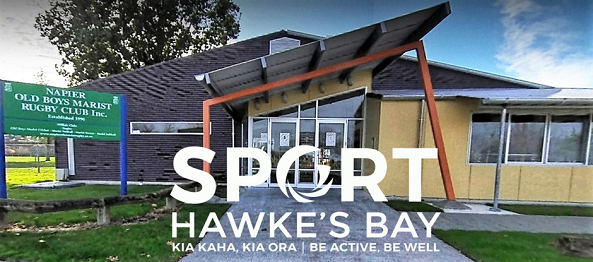
The Napier workshop will take place between 7.00am and 8.30am (over breakfast), on Wednesday 23 November. You can register to attend this event, by clicking here.
2022 National Sport Club Survey – Manawatu Workshop Confirmed ...
Hard on the heels of the Napier workshop, Sport Manawatu will be hosting a workshop luncheon on the 2022 National Sport Club Survey on Thursday, 24 November at 12.30pm, at the SquashGym, Palmerston North. For further details, please contact Nick Fee, Community Partnerships Adviser at Sport Manawatu, by clicking here.

A reminder that 2022 is the fifth year for the National Sport Club Survey project, with around 900 sport clubs engaging with the survey this year, across all 16 regions of New Zealand.
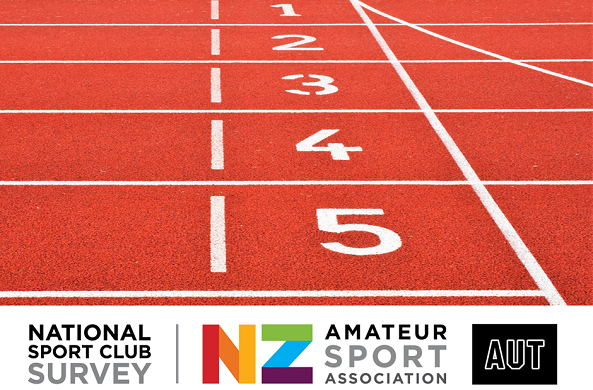
Several important metrics are being tracked year-on-year relating to club membership, governance and finances. In 2022, a comprehensive set of survey items related to club perceptions of councils/local government and the new Incorporated Societies legislation were included for the first time.
Board Briefing – Monday, 7 November ...
A reminder that the Association is hosting a Board Briefing on Monday, 7 November at 6.00pm. (The briefing will be one hour in duration).

ZOOM details have been provided to Association members already, however if you are interested in attending this update and have not yet had an opportunity to respond, please contact the Association by clicking here to register your interest.
New Zealand Rugby Acts To Limit Risks Of Head Injury ...
Earlier this week New Zealand Rugby (NZR) announced three game innovations that will be trialled for the 2023 community rugby season, designed to improve player safety, the flow of the game and keep the ball in play more.
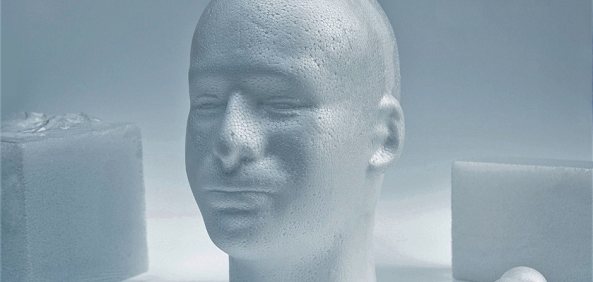
(Reducing the potential for head injury is a key focus of the new rugby laws)
The changes are supported by the 26 Provincial Unions (which comprise and control NZR) and include a significant reduction in tackle height to below the sternum across all community rugby, including senior premier club and school First XV grades.
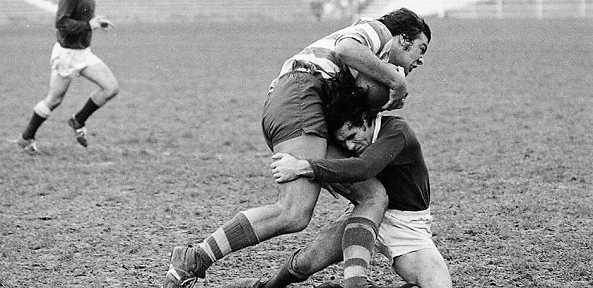
(Tackle technique harking back to the mid-1970’s will now be required for community rugby).
The new tackle law in particular is a welcome development for parents concerned by the risks of head injury arising from concussion. Feedback from community grades trialling the reduced tackle height in the 2022 season found that 78% of participants believed it improved the tackler’s safety, 73% felt it made the game faster and 72% thought there were more opportunities for offloads. The new rules are a positive step for the community game.
From The Archives ...
ACTIVE AND ALERT
EVENING POST, VOLUME CXXIX, ISSUE 111, 11 MAY 1940, PAGE 20
"They are a youthful band, this Athletic second division team, but if it was the courage of youth which led them thus to throw down the gauntlet, that courage gained reinforcement from the presence in their ranks of that tried and trusty warrior, Dick Pelham, with his wise head to direct operations and his sure handling, running, and kicking to assist in carrying them out.
Pelham's years of service to sport in Wellington have won for him a warm spot in the hearts of most people, and he moves in such an atmosphere of goodwill that, although he was continually breaking up Onslow attacks or starting off an Athletic raid, not even the most ardent Onslow fans — and there are usually plenty of these at Nairnville Park — could find it in their hearts to condemn him. Even the ranks of Tuscany indeed could scarce forbear to cheer.'
Richard (Dick) Pelham was born on 24 May 1901, the son of John Charles (Joe) Pelham and Atiraira Taro Haunui. He had two sisters and two brothers and was brought up in Rotorua by his extended whanau. He was one of the first Maori to win a New Zealand national swimming title and was affectionately known as “the Prince of Maori sport”.
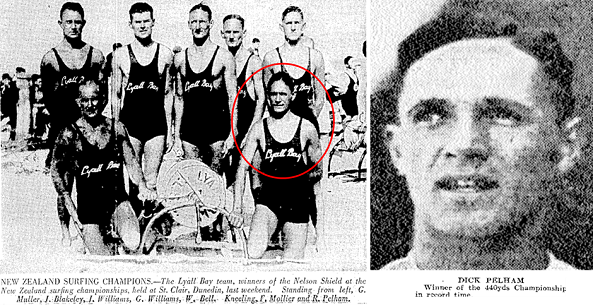
(Pelham, circled, as a member of the 1936 Lyall Bay SLSC team)
In 1925, Dick was a member of the Auckland swimming team which took part in the national championships in Christchurch, producing an outstanding performance in the 440 yards event in record time. In the winter of that year he played rugby for the Ponsonby rugby club and was included in the trials for the Maori side to tour at the invitation of the French Rugby Federation. He was selected for the team as a utility back. The Maori played 31 matches, losing only six and beating the famous Cardiff club side twice.
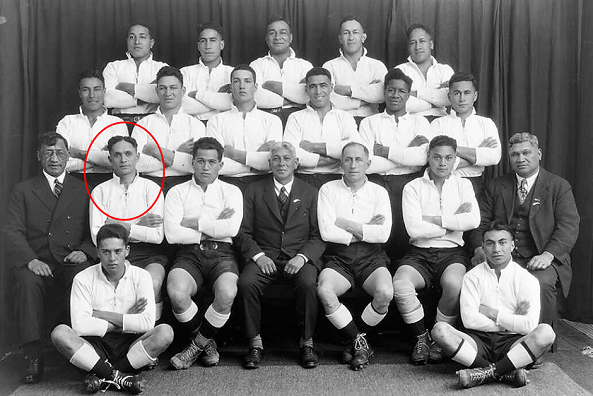
(The New Zealand Maori Rugby Team, 1930, with Dick Pelham circled)
When the team disbanded in Wellington on its return, Dick took a job driving a laundry van and settled in the capital. He joined the Athletic Rugby Club and was a member of the Wellington representative side for several seasons, playing for the Maori against two overseas touring teams before he retired in 1932. All the while he retained an active interest in swimming having linked up with the Lyall Bay Surf Lifesaving Club. He was a member of the Wellington water polo team which won the national championships in 1948 and was in the Lyall Bay teams which were supreme at the national surf lifesaving championships in 1931 and 1935.
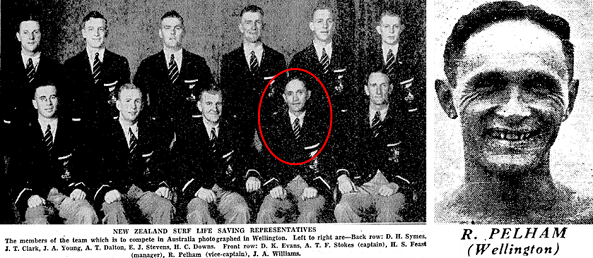
(Pelham, circled, as a member of the 1938 New Zealand SLS team)
When he gave up his job driving a laundry van in 1942, he took over a taxi license and was driving until his retirement in 1962. In 1971 Dick and his wife Margery (Midge) returned to Rotorua. Dick died in Rotorua on 28 February 1975. (With thanks to "Te Tohu Taakaro Aotearoa Charitable Trust" for some of the biographical information used in this article).
The Final Word ...
“There's no limit to the amount of good you can do, if you don't care who gets the credit.”
(Ronald Reagan)